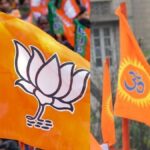The Congress party has leveled serious allegations against the Election Commission, accusing it of complicity in manipulating voter lists to benefit the ruling Bharatiya Janata Party . Senior Congress leaders claim that multiple voters share identical identification numbers, undermining the integrity of India’s electoral process.
In a press conference held on Monday, Congress representatives expressed deep concern over the EC’s inaction regarding these discrepancies. They highlighted that such anomalies pose a significant threat to the country’s democratic framework. The party is actively exploring legal, political, and legislative avenues to address the issue, emphasizing their commitment to safeguarding electoral democracy.
This development follows a series of similar allegations against the EC. Notably, the Trinamool Congress accused the commission of voter fraud in West Bengal, labeling it an “epic scam.” TMC leader Derek O’Brien stated that while the EC had “admitted” an error, it had not “accepted” responsibility, raising further questions about the commission’s accountability.
Rahul Gandhi, leader of the Congress party, has also raised concerns about suspicious voter rolls in Maharashtra. He alleged that 3.9 million new names were added to the voter lists before local elections, a figure surpassing the total number of voters added in the last five years. Despite projections favoring the Congress-led alliance, they lost the election, prompting questions about the legitimacy of the polls. The EC has denied any irregularities and stated it would respond in writing.
These allegations are not isolated incidents. In Karnataka, the Indian National Congress accused an NGO, Chilume Trust, of collecting personal voter data, including caste, age, gender, Aadhaar numbers, and phone numbers. The party alleged that BJP workers, through the NGO, gathered this information to delete legitimate voters aligned with the opposition and add fake voters to bolster BJP’s vote count. The Bruhat Bengaluru Mahanagara Palike, Bengaluru’s civic body, blacklisted the NGO, and a police complaint was filed against them for breach of trust.
The Congress has also taken issue with the BJP’s advertising practices. Approximately eleven months ago, the party filed a complaint with the EC against what it described as “misleading” advertisements by the BJP, seeking their removal. The Congress further alleged violations of the model code of conduct by senior BJP leaders, including Prime Minister Narendra Modi.
These series of allegations underscore a growing distrust among opposition parties toward the EC’s impartiality. The integrity of voter lists is fundamental to the democratic process, ensuring that elections reflect the genuine will of the people. As such, the EC’s role in maintaining transparent and accurate electoral rolls is under increased scrutiny.
In response to these accusations, the EC has consistently denied any wrongdoing. However, the mounting claims from various political entities have intensified calls for comprehensive electoral reforms. The Congress party’s EAGLE team, dedicated to monitoring electoral malpractices, has been at the forefront of these revelations, aiming to expose and rectify discrepancies in the voting system.
The BJP, on its part, has dismissed these allegations as baseless. Party spokespersons argue that the opposition’s claims are attempts to undermine the electoral process and discredit legitimate election outcomes. They assert that the EC operates as an independent body, free from political influence, and that the allegations are politically motivated.
The issue of voter list integrity is not confined to one state or election. It has been a recurring theme across various regions, prompting debates about the need for systemic changes. For instance, in Karnataka, concerns were raised about the collection and sale of voter data during the 2023 Legislative Assembly elections. An NGO was accused of amassing personal voter information, leading to investigations and heightened awareness about data privacy in the electoral context.
The drive to link voter IDs with Aadhaar numbers has been a contentious issue. While intended to eliminate duplicate entries and enhance the accuracy of voter lists, critics argue that it could lead to disenfranchisement and breaches of privacy. The Election Laws Act of 2021 allows such linking on a ‘voluntary’ basis, but its implementation has faced legal challenges and public skepticism.
The credibility of electoral processes is paramount in any democracy. Allegations of voter list manipulation, if proven true, can erode public trust and lead to questions about the legitimacy of elected governments. Therefore, it is imperative for the EC to address these concerns transparently and take corrective measures where necessary.



 BJP Poised to Elect New National President Ahead of Key RSS Meeting
BJP Poised to Elect New National President Ahead of Key RSS Meeting 